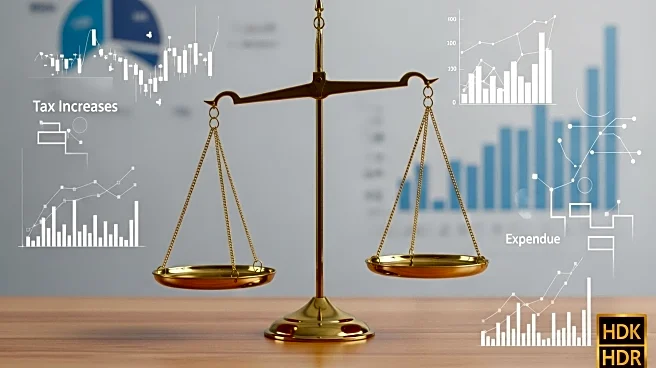What's Happening?
The UK Chancellor of the Exchequer, Rachel Reeves, has indicated that tax rises and spending cuts are being considered in the upcoming budget. This move comes as the government faces significant economic
challenges, including a potential fiscal hole of up to £50 billion. Reeves has emphasized the importance of adhering to fiscal rules, which require day-to-day spending to be funded by tax receipts rather than borrowing. The Labour Party had previously pledged not to raise taxes on working people, but the current economic situation may necessitate a reevaluation of this stance. The International Monetary Fund has forecasted UK growth of 1.3% in 2025 and 2026, highlighting concerns about the impact of potential tax increases on economic growth.
Why It's Important?
The consideration of tax rises and spending cuts by the UK government is significant as it could affect economic growth and public sentiment. Raising taxes may upset voters and Labour lawmakers, while spending cuts could lead to social security reforms that have previously faced opposition. The government's decisions will have implications for businesses and individuals, potentially impacting disposable income and consumer spending. The economic outlook provided by the IMF suggests that growth remains fragile, and any fiscal measures could influence the trajectory of the UK economy. Stakeholders, including businesses and taxpayers, will be closely monitoring the government's fiscal plans and their potential impact on the economy.
What's Next?
The UK government is expected to present its fiscal plans in the Autumn Budget on November 26. This will provide further clarity on the measures being considered to address the fiscal challenges. Businesses and individuals will be looking for guidance on how these plans will affect them, particularly in terms of tax changes and spending cuts. The government may face pressure from various stakeholders to balance fiscal responsibility with economic growth and social welfare considerations. The Labour Party's previous pledges and the current economic situation will likely influence the government's approach to fiscal policy.
Beyond the Headlines
The potential tax rises and spending cuts could have broader implications for the UK's political landscape. The Labour Party may face internal tensions as it navigates the need for fiscal measures that could contradict previous pledges. Additionally, the government's approach to fiscal policy may influence public perception and voter sentiment, particularly as the country prepares for future elections. The economic challenges and fiscal decisions could also impact the UK's position in international markets and its ability to attract investment.









